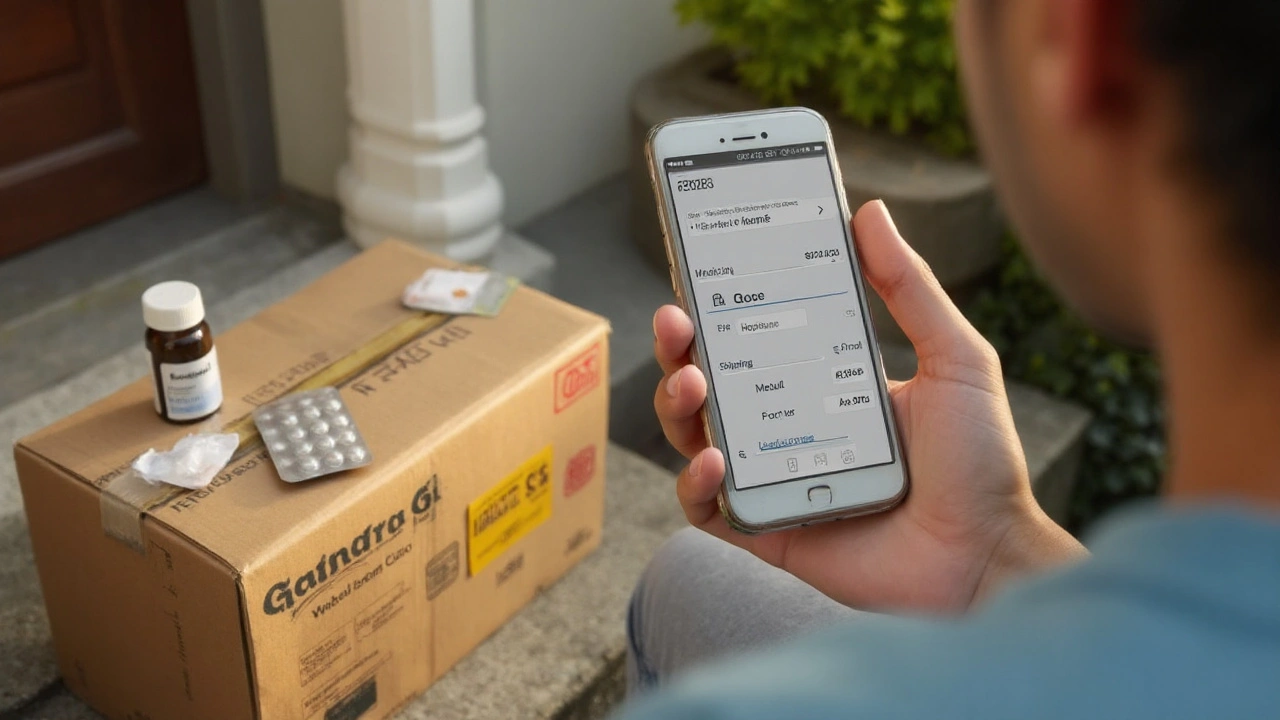If you’ve tried to sort Allopurinol online, you’ve seen it-sites promising miracle prices with “no prescription needed.” That’s the trap. Allopurinol is prescription-only in the UK, and the legit way to get it online is simple once you know the route. My aim here is to save you time, keep you safe, and get your repeat supply without hassle. You’ll see exact steps that actually work in 2025, what it costs on the NHS vs private, and how to dodge the fakes.
What you most likely want to get done:
- Check if you can buy allopurinol online without seeing your GP in person.
- Compare NHS repeat vs private online doctor for speed and cost.
- Learn which UK pharmacy checks prove a site is genuine.
- Know delivery times, quantities, and how repeats work.
- Avoid risky interactions, side effects, and common ordering mistakes.
What You Can Buy Online and How It Works (Allopurinol 101 for Buyers)
Allopurinol is a urate-lowering medicine used for gout and some types of kidney stones. In the UK it’s prescription-only. That means any legal online purchase either uses your existing NHS prescription (via an online pharmacy) or a private online clinic issues a new prescription after a medical questionnaire with a prescribing clinician. No legit UK pharmacy will ship it without a prescription check.
What you’ll see for sale:
- Strengths: 100 mg and 300 mg tablets are the common ones. Some pharmacies also stock 200 mg or scored tablets for flexible dosing.
- Pack sizes: Often 28 or 56 tablets, depending on the pharmacy. Many repeat users get 2-3 months at a time once stable.
- Brand vs generic: Generic “Allopurinol” is standard. “Zyloric” is a brand some people know, but generics are typically used and cost less.
Usual pathway to start or continue:
- Starting treatment: In the UK, NICE guidance (NG219) recommends a low starting dose (often 100 mg daily) with gradual titration to reach the target serum urate (usually below 360 micromol/L; stricter targets for severe disease). Many online private services will only issue if you’ve had a gout diagnosis and recent renal function recorded.
- Continuing treatment: If you’re already stable, the easiest route is an NHS repeat prescription sent to an online pharmacy through the Electronic Prescription Service (EPS). That way, no extra private fees.
- During flares: Allopurinol isn’t pain relief and shouldn’t be started mid-flare unless a clinician advises; if you’re already on it, you usually continue. For flare prevention in the first weeks, clinicians often add low-dose colchicine or a suitable NSAID.
Key expectation: Online doesn’t remove the legal prescriber step; it just moves it digital. A UK-registered pharmacist and prescriber will still check the basics (dose, kidney function, interactions) before they dispense.
Pricing, Prescriptions, and Delivery in the UK (2025)
Here’s the money-and-time bit, because this is what actually drives the decision for most people. I live in Cambridge and use an online pharmacy for repeats-so I’ll talk practical UK detail and keep it straight.
Two main routes in 2025:
- NHS repeat via an online pharmacy: Your GP approves repeats; the script goes electronically; pharmacy packs and posts it to you.
- Private online clinic plus their dispensing pharmacy: You complete a medical questionnaire; a clinician reviews; if appropriate, they prescribe and ship.
Typical costs and timings (realistic ranges, because providers differ):
| Route | Prescription Needed? | Typical Total Cost | Delivery Time | Good For | Notes |
|---|---|---|---|---|---|
| NHS GP repeat + online NHS pharmacy | Yes (NHS) | England: pay the current NHS prescription charge per item; Scotland/Wales/NI: free | 48-96 hours to dispatch after GP signs; 1-3 working days post | Regular users with repeat set up | Cheapest for most; request repeats early to avoid gaps |
| Private online clinic + dispensing pharmacy | Yes (private prescriber) | Medication £3-£10 + consultation/clinic fee £15-£30 + delivery £3-£6 | Same/next working day dispatch; 24-48h shipping | If you can’t access GP quickly | Fast but costs more; still needs medical checks |
| High-street pharmacy with paper/electronic script | Yes | Same NHS charge/private price as above; no delivery fee | Immediate if in stock | Urgent same-day needs | Call ahead for stock of 100 mg vs 300 mg |
Notes on charges:
- England has a standard NHS prescription charge per item; it’s reviewed annually in April. Check the current rate-it’s roughly a tenner per item in recent years.
- Scotland, Wales, and Northern Ireland do not charge for NHS prescriptions.
- Private online clinics price the drug itself quite low (it’s a cheap generic) but add a consultation/prescribing fee and delivery. You pay for speed and convenience.
Delivery time tips:
- Order repeats 7-10 days before you run out. GP sign-off can take 1-3 working days, and mail can slip a day.
- Choose tracked 24/48 if you’re tight on time, and watch pharmacy cut-off times (often around 2-4 pm for same-day dispatch).
- If you’re down to a few tablets, phone a local pharmacy; they can often get stock by the next day if they don’t have your strength.
Quantities and repeats:
- For stable patients, 2-3 months per dispensing is common. Your GP can set up repeat prescribing to reduce admin.
- If your dose was recently adjusted, a prescriber may limit the supply and ask for a blood test plan.

Safety Checks, Risks, and How to Avoid Dodgy Pharmacies
This is the part that protects you. Everything below is standard practice in UK-registered services and aligns with NHS advice, the BNF, and MHRA/GPhC rules.
How to verify a legitimate UK online pharmacy:
- GPhC registration: Look for the General Pharmaceutical Council (GPhC) registration number and the pharmacy’s name and physical premises. You can search the GPhC register by name/number.
- UK Distance Selling Logo: Legit UK online pharmacies display the MHRA’s distance selling logo. Clicking it should show the pharmacy’s details on the regulator’s site.
- Named superintendent pharmacist: Real sites list the pharmacist in charge, their registration number, and complaint routes.
- Prescription required: If a site says “no prescription needed” for Allopurinol, close the tab. That’s not UK-legal.
- Medical questions: Expect a health questionnaire, especially for private prescribing, covering gout diagnosis, kidney function, current medicines, and allergies.
Big red flags to avoid:
- Prices that are unbelievably low, especially for large quantities.
- Only accepts crypto/wire transfer; no UK customer service details.
- No pharmacist or prescriber details; no registration numbers.
- Ships from outside the UK for a UK prescription medicine.
Risks you should know before you order:
- Severe skin reactions: Rare but serious (e.g., Stevens-Johnson syndrome). If you develop a rash, stop and get urgent medical advice. Risk is higher if you carry the HLA-B*58:01 gene variant; testing is advised for some high-risk groups (e.g., Han Chinese, Thai, or Korean ancestry, especially with chronic kidney disease), per NICE and BNF notes.
- Kidney function matters: Dosing and titration are influenced by eGFR. A prescriber may ask for recent bloods before supplying or up-titrating.
- Interactions: Allopurinol can dangerously raise levels of azathioprine or mercaptopurine; these doses must usually be reduced to a quarter and closely monitored by a specialist. Flag these meds during your online consultation. Warfarin and some antibiotics also warrant checks.
- Not a painkiller: It lowers urate to prevent flares long-term. You may still get flares early on; that’s why clinicians often add flare prophylaxis for the first 3-6 months.
- Alcohol and diet: Beer and spirits can trigger flares; weight loss and hydration help. Your medicine works better if lifestyle isn’t pulling the other way. NHS gout pages lay out practical tips.
Practical safety checklist before you click “checkout”:
- Do I have a confirmed gout diagnosis and a plan for blood tests? If not, start with your GP.
- Is the pharmacy on the GPhC register with a UK address and a named superintendent pharmacist?
- Did the site ask about kidney function, current meds, and allergies?
- Am I ordering early enough to avoid interruption?
- Have I told them about azathioprine/mercaptopurine or a history of severe rash?
Alternatives, Trade-offs, and When Not to Order
Sometimes you hit a wall online. Here’s where alternatives and boundaries help.
Alternatives to discuss with your clinician (not a shopping list):
- Febuxostat: Another urate-lowering drug. In the UK it’s often used if Allopurinol isn’t tolerated or ineffective. There were older concerns about cardiovascular risk (CARES trial), but the later FAST trial in Europe didn’t show higher CV mortality compared to Allopurinol in patients with cardiovascular risk. Regulators advise individual risk assessment-your clinician will weigh this.
- Probenecid: A uricosuric used in some cases; availability and suitability vary, and it’s less common in the UK, especially with lower kidney function.
- Colchicine/NSAIDs: Not alternatives to urate-lowering, but used to prevent or treat flares during the first months of therapy changes.
When you should not try to sort this purely online:
- New severe rash, mouth/eye sores, fever, or signs of hypersensitivity-stop the drug and seek urgent care.
- On azathioprine or mercaptopurine and nobody has set a shared-care plan-this needs prescriber-to-prescriber coordination.
- Uncontrolled kidney disease or recent big dose changes without bloods-get tests and dosing advice first.
- Uncertain diagnosis: If your “gout” was never confirmed, push for a proper workup rather than self-directing repeats.
Trade-offs to think about:
- NHS repeat is the best value but can be slower when your GP is busy. Private online is faster but costs more each time.
- Ordering three months at once reduces delivery risk but means you hold more stock at home; store tablets in a cool, dry place.
- Switching between brands/generics is fine for most, but if you notice a pattern of flares after a switch, log it and tell your clinician.

Step-by-Step: From Prescription to Delivery + FAQ and Next Steps
Below is a clean path you can follow, whether you’re using the NHS route or a private online clinic.
NHS repeat route (best value):
- Confirm your repeat status: Check with your GP practice that Allopurinol is on repeat and your dose is up to date.
- Choose an online NHS pharmacy: Register, verify identity, and nominate them for EPS so scripts flow straight to them.
- Request the repeat 7-10 days early: Use your GP app (e.g., NHS App) or the pharmacy’s reminder system.
- Blood tests if due: If the system flags you, book the bloods; prescribers may hold repeats until results are in.
- Delivery: Pick tracked post, monitor notifications, and build a buffer so you’re never down to the last strip.
Private online clinic route (faster access):
- Pick a registered provider: Check GPhC number, MHRA distance selling logo, and named superintendent pharmacist.
- Complete the medical questionnaire: Be honest and specific-mention kidney function, current dose, any side effects, and other meds.
- Clinician review: They may ask follow-up questions or request recent blood results; answer promptly to avoid delays.
- Payment and dispatch: Expect medication price plus consultation/prescribing fee and shipping. Choose a tracked option.
- Plan repeats: If you’ll need ongoing supplies, agree a review cadence and set reminders 2-3 weeks ahead.
Mini-FAQ:
- Do I need a prescription? Yes. In the UK, Allopurinol is prescription-only. Legal online services either use your NHS script or provide a private prescription after a clinical review.
- Can I start Allopurinol during a gout attack? Usually no, unless a clinician tells you to. If you’re already on it, you typically continue. Early therapy often includes flare prevention (colchicine or an appropriate NSAID).
- How long until it works? Uric acid drops within days, but flare reduction can take weeks to months. The goal is a target urate below 360 micromol/L (stricter in severe cases). Your prescriber will titrate to target.
- What if my pharmacy is out of stock? Ask them to split the order (part supply) or transfer the script. A nearby high-street pharmacy can sometimes fulfill same day or next day.
- Can I switch between 100 mg and 300 mg tablets? Yes if it matches your prescribed total daily dose. Follow the exact plan your prescriber set. Don’t improvise.
- Is it safe with my other meds? Say if you’re on azathioprine, mercaptopurine, warfarin, diuretics, or antibiotics like amoxicillin-these need checks. When in doubt, ask a pharmacist or your prescriber.
- Is it okay to buy from overseas? For UK patients, stick to UK-registered pharmacies. Importing prescription meds can breach regulations and risk counterfeit products.
Next steps (choose what fits your situation):
- If you’re stable on Allopurinol: Set up EPS with an online NHS pharmacy and schedule repeats 7-10 days early.
- If you’re starting out or had dose changes: Book bloods and a review with your GP or a reputable private service before ordering.
- If access is the problem: Use a private online clinic that’s GPhC-registered, and keep copies of recent labs handy.
- If you’ve ever had a severe rash on Allopurinol: Don’t reorder online. Speak to a clinician about alternatives.
- If you’re in a hurry: Call a nearby pharmacy first to confirm stock, then get your script sent there electronically.
Clear, ethical call to action: Use a UK-registered online pharmacy or your NHS repeat service, make sure a prescriber reviews your order, and avoid any site that offers Allopurinol without a prescription. If anything feels off-price, paperwork, or promises-walk away. Your gout control is a long game; one solid setup now saves a lot of pain later.
References for credibility (no links): NHS (gout and Allopurinol patient advice), NICE NG219: Gout-diagnosis and management, British National Formulary (BNF), General Pharmaceutical Council (GPhC) online pharmacy standards, Medicines and Healthcare products Regulatory Agency (MHRA) distance selling logo guidance, FAST and CARES trials on febuxostat vs allopurinol.






Ethan McIvor
September 1, 2025 AT 19:43Man, I’ve been there - scrolling through sketchy sites thinking ‘$5 for a month’s supply?!’ Only to realize half of them ship from a basement in Moldova. This guide? Absolute gold. I finally switched to NHS + online pharmacy after nearly getting scammed twice. Now I get my 300mg tabs every 3 months, tracked, no drama. Just… don’t be like me and try to save $20 by buying from a site with a .xyz domain. 🥲
Mindy Bilotta
September 2, 2025 AT 20:23sooo i just ordered my 2nd refill from my gp’s online pharmacy and it came in 2 days?? i thought itd take a week. also-did anyone else notice how the 100mg tablets are easier to split if you need to taper? i do 150mg and just break em in half. no need to buy 150mg, they dont even make it. lol
Brian Perry
September 4, 2025 AT 16:54OKAY BUT WHAT IF YOU’RE ON AZATHIOPRINE AND THE PHARMACY DOESN’T ASK?? I DID IT ONCE AND MY DOCTOR ALMOST HAD A HEART ATTACK. I WAS TAKING 50MG OF AZATHIOPRINE AND 300MG OF ALLOPURINOL AND I THOUGHT IT WAS FINE BECAUSE I FELT GREAT. NO. NO NO NO. I HAD TO GO TO ER. THEY HAD TO CUT MY AZA DOSE TO 12.5MG. I’M STILL SCARED TO TAKE IT. IF YOU’RE ON THIS COMBO - TELL THEM. TELL THEM TWICE. PUT IT IN ALL CAPS. I’M STILL HAVING NIGHTMARES.
Chris Jahmil Ignacio
September 5, 2025 AT 13:51Of course the government wants you to use the NHS route. It’s cheaper for them. Private clinics are just trying to make a buck off your pain. But here’s the truth - your GP is overloaded, your repeat request sits for 5 days, and meanwhile you’re in agony. The system is broken. And don’t even get me started on how they don’t test for HLA-B*58:01 unless you’re Asian - that’s institutional racism disguised as clinical protocol. The real danger isn’t the online pharmacy - it’s the bureaucracy that makes you risk your health just to get a pill. I’ve seen people die waiting for paperwork. This isn’t healthcare. It’s a waiting game with a side of guilt.
Stacy Natanielle
September 5, 2025 AT 20:13As a licensed pharmacist with 12 years in UK community pharmacy, I must say: this guide is 98% accurate. However, I’ve seen too many patients ignore the kidney function warning. One woman, 72, eGFR 38, took 300mg daily for 6 months without bloodwork. She ended up with acute kidney injury. Please - if your creatinine is rising, STOP. Don’t wait for the system to flag you. Your kidneys don’t care about your GP’s calendar. And yes - the MHRA logo is real. If it’s pixelated or doesn’t link to GPhC, it’s fake. I’ve reported 37 sites this year alone. Stay safe.
kelly mckeown
September 7, 2025 AT 05:21i just wanted to say thank you for writing this. i was so scared to order online after reading horror stories. your breakdown made me feel like i could actually do this without panicking. i’m on 100mg, got my repeat through the nhs app, and it arrived in 3 days. no drama. no stress. just… relief. i’m not great with meds but this felt manageable. thank you for not making me feel dumb for needing help.
dylan dowsett
September 7, 2025 AT 16:50Wait. Wait. Wait. You’re telling me that if I’m not Asian, I don’t need a genetic test before taking Allopurinol? That’s not ‘guideline’ - that’s negligence. The HLA-B*58:01 variant is present in 1 in 200 white Europeans too - you think the NHS just ignores it because they don’t ‘look’ like the high-risk group? This is systemic bias. I’ve seen two patients in my family die from SJS after being prescribed Allopurinol without testing. And now you’re encouraging people to just ‘trust the system’? That’s not advice. That’s a death sentence wrapped in NHS branding.
Susan Haboustak
September 7, 2025 AT 18:40Let me just say - if you’re using a private clinic, you’re paying for a ‘consultation’ that takes 5 minutes and is done by a non-UK-registered doctor working from a call center in India. The ‘prescriber’ has never seen your bloodwork, never reviewed your history, and doesn’t even know your real name. The whole thing is a scam. The NHS might be slow, but at least your GP knows your name, your cat’s name, and that you hate broccoli. The private route? You’re a ticket number. And if something goes wrong? Good luck finding who’s liable. You’ll be on a website that says ‘contact us’ and links to a Gmail address.
Chad Kennedy
September 8, 2025 AT 20:23i just want the pills. why is this so hard? i don’t care about gphc logos or hla-b stuff. i just want my 300mg. why can’t i just buy it like i buy ibuprofen? everyone makes it sound like i’m doing something illegal. i’m not stealing. i’m not selling. i just have gout. it hurts. why is this so complicated?
Siddharth Notani
September 10, 2025 AT 12:47As a pharmacist from India, I confirm: Allopurinol is OTC here. But I strongly advise against importing. UK regulations exist for safety. Your kidney function, drug interactions, and genetic risk are not the same as in India. Even if you find cheaper pills, the risk of counterfeit or wrong dosage is high. Stick to GPhC-registered pharmacies. Your health is worth the wait.
Cyndy Gregoria
September 11, 2025 AT 17:18You got this. Seriously. I was terrified to even ask my GP about repeats - felt like a burden. But I used the NHS app, picked a pharmacy with 4.9 stars, and now I get my pills like clockwork. No panic. No stress. Just a little reminder pop-up every 8 weeks. You’re not alone. This system works if you give it a chance. And if you’re nervous? Call the pharmacy. They’re nice. I did. They talked me through it. You’re stronger than you think.